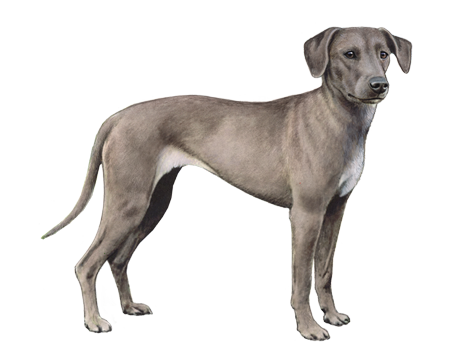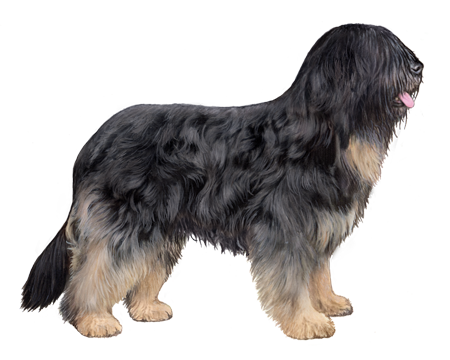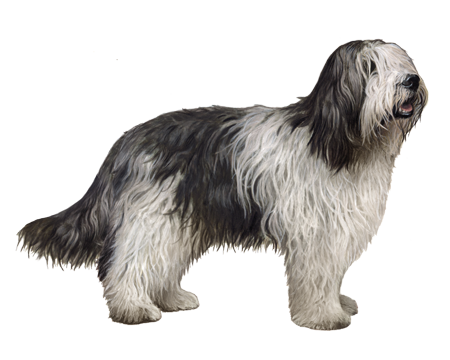
Mudi
Bred as an all-purpose farm dog, the Mudi is a courageous, agile, alert working dog and protector. It's a rare breed seldom seen outside of its native Hungary.
Interested in discovering if your dog is a Mudi?
Check out Wisdom Panel's DNA tests.

Mudi Traits
General Appearance
The Mudi is an agile, medium-sized dog with almost square proportions. Alert and surefooted, it moves with a free, tireless gait and is capable of quick and sudden movements.
Coat and Coloring
The Mudi has short, straight, smooth hair on its face and the front of its legs. On its body, the hair is dense and wavy to curly, between one and three inches long on other parts of its body with pronounced feathering on the back of the forearms and upper thighs. The hair is known to form cowlicks and ridges, giving the coat a curled appearance.
The Mudi comes in five colors: black (all over with no shading); brown with colors ranging from light brown to chocolate; gray (all over with no shading); gray-brown; or yellow and white with colors ranging from almost white to darker golden shades. The merle pattern is allowed with any color.
Distinctive Physical Traits
The Mudi has a muscular, tight build with a short, straight, taut back, powerful hindquarters, and a full length or natural stump tail. Their almond-shaped eyes curve up at the outer edges, giving the Mudi a daredevil expression.
The color of their eyes depends on their coat color. Merle-patterned dogs have brown, blue, or brown speckled with blue eyes; brown, gray, or gray-brown dogs have lighter brown eyes; and yellow and white dogs have dark brown, lighter brown, blue or brown speckled with blue eyes.
Mudi Temperament
These working dogs are alert, energetic, and enthusiastic about completing tasks. A strong drive to work can make the Mudi a challenge for novice dog owners. The breed is best suited to those who can provide strong leadership, consistent training, and a lot of exercise—preferably in the form of a job.
The Mudi makes an excellent watchdog. They are loyal protectors of their properties and their families, and somewhat suspicious of strangers without being overly aggressive. These dogs can also be vocal and may not be the best choice for apartment life.


Mudi History
The Mudi is a Hungarian working dog with similar origins to the Pumi and Puli. As one of the small sheepdog breeds that appeared around the ninth century, the Mudi herded flocks of sheep and cattle, exterminated vermin, and guarded the house.
The Mudi didn't become a distinct breed until 1930 when a local museum director, Deszö Fényesi, started a breeding program. His efforts led to the Mudi earning recognition as a breed in 1936.
Although the Mudi remains a popular herding breed in Hungary, where it works alongside shepherds to move flocks with up to 500 sheep, it's rare outside of its native country.
Mudi Care
Nutrition
Feed the Mudi a high-quality dog food that is appropriate for their life stage (puppy, adult, senior) and consider a diet formulated for active breeds. Portion out their food with a measuring cup and limit treats to no more than 10 percent of their daily calories to avoid overfeeding.
Grooming
When it comes to grooming, the Mudi is low maintenance: an occasional bath and brushing to keep them clean and remove dead hair is all it takes to keep these dogs looking their best.
The Mudi also requires regular ear cleanings, nail trims, and a dental care routine that includes at-home teeth brushing and professional cleanings.
Exercise
These are energetic working dogs that require lots of exercise. In the absence of farming work, the Mudi makes a great running companion and also enjoys brisk walks, hiking, and swimming.
These highly intelligent dogs also excel in dog sports such as agility, flyball, obedience, and herding. Keeping the Mudi well-exercised ensures it won’t get into trouble.
Training
Training is a must. The Mudi is intelligent and keen to learn new things and training helps their channel boundless energy in positive directions. Focus on positive reinforcement and rewards-based training and avoid repetitive activities, which will cause these dogs to lose interest.
Early socialization is also important to help the Mudi feel more comfortable with strangers.

Breed Group
Herding
The herding group is a diverse category. These highly intelligent breeds were developed to guard and control the movement of livestock.
Resources
https://www.akc.org/dog-breeds/mudi/
http://images.akc.org/pdf/breeds/standards/Mudi.pdf
Reviewed July 26, 2020 by Cindy Elston, DVM, MPH























































